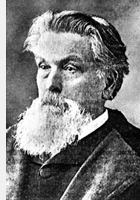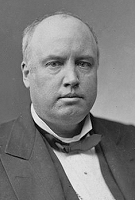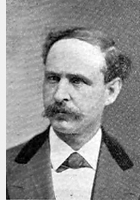Liberal University of Oregon
The Braden-Underwood Debate - A Silverton Parable
Dissected by Gus Frederick
| Of course those names Homer dropped in this story are pretty much unknown to us today. We can imply from their actions that this event was a debate about religion, and that the message is that even these differences were not enough to turn a community against itself. But ever since I first read this passage in the early 1970s, I wondered about the personalities involved. Who was Reverend Clark Braden? And Colonel Robert Ingersoll? Or B.F. Underwood? And of course what about that blind eleventh century Arab poet? Who was he? In his short parable of Silverton citizenry, Homer reveals something else about our community: It is no back-water hick town! As to the timing of this particular event, I had previously narrowed it down to 1873, as all three of the parties mentioned above were active orators during this time. Homer would have been six or seven years old then. However, my associate Fred Parkinson has provided printed evidence that places the debate squarely in November of 1888, a little over a year after the founding of the Silverton Secular Union. Homer would have been 21 in 1888, and this seems more realistic, even though both Braden and Underwood had visited Silverton before. Here are several Oregon Statesman articles that Parkinson discovered:
On November 14, 1888, four members of the Silverton Secular Union signed a letter to the editor of the Statesman that: "...much dissatisfaction having been expressed to us in regard to the admission fee..." The Statesman Editor added the following snarky paragraph under the Letter:
Knowing Homer's extended family background, it's a sure bet that at least one or more of the "...ten men that were on their feet..." were related to him. Indeed, his father, T.W. Davenport was listed in media accounts as the "Grand Chief Moderator" of the debate. He wisely does not elaborate on specific Silverton personalities in this parable, yet is quite specific in the names of the outside participants.  Through our modern version of the telegraph, (aka "Google"), I was able to find out that Rev. Clark Braden was an evangelic preacher of the Disciples of Christ. The term "Campbellite" Homer used, (in quotes) referred to the followers of the early 19th century evangelical Christian Restoration Movement. It was initiated by Barton W. Stone and Alexander Campbell. But the Campbell name stuck. Depending upon how the term was used, and by whom, "Campbellite" was like the word "Infidel" - either a pejorative or a complement. The Disciples of Christ were one of several new churches that grew out of this movement. They are now known as the "Christian Church." Through our modern version of the telegraph, (aka "Google"), I was able to find out that Rev. Clark Braden was an evangelic preacher of the Disciples of Christ. The term "Campbellite" Homer used, (in quotes) referred to the followers of the early 19th century evangelical Christian Restoration Movement. It was initiated by Barton W. Stone and Alexander Campbell. But the Campbell name stuck. Depending upon how the term was used, and by whom, "Campbellite" was like the word "Infidel" - either a pejorative or a complement. The Disciples of Christ were one of several new churches that grew out of this movement. They are now known as the "Christian Church."During the post-Civil War era, Braden was an extremely popular traveling preacher/orator, and possibly chose Silverton because of it's known diverse population that included many "infidels and freethinkers." He made his name debating the "evils" of other beliefs and organizations. These included the Reformed LDS Church, Methodists and "Seventh Dayers." And of course, free thinkers and infidels. From 1876 to 1877 Clark Braden served as President of Abingdon College, in Abingdon, Illinois. Between late 1873 and late 1875 Clark Braden apparently served briefly in that same capacity at "Christian College," also in Abingdon. After the death of his wife, Braden spent much of the 1880s and 1890s returning to public debates on religious topics. From 1899 to 1900 he returned to the academic world for a short time, filling the presidency at Southern Illinois Christian College. He died on Mar. 6, 1915, at the home of his son in Carbon, California.  On the flip side of this world view were the Freethinkers. Atheists and Agnostics for the most part. Colonel Robert Green Ingersoll was one of the most prominent of that latter persuasion in the nineteenth century. His Wikipedia page says: On the flip side of this world view were the Freethinkers. Atheists and Agnostics for the most part. Colonel Robert Green Ingersoll was one of the most prominent of that latter persuasion in the nineteenth century. His Wikipedia page says:Ingersoll was most noted as an orator, the most popular of the age, when oratory was public entertainment. He spoke on every subject, from Shakespeare to Reconstruction, but his most popular subjects were agnosticism and the sanctity and refuge of the family. He committed his speeches to memory although they were sometimes more than three hours long. His audiences were said never to be restless. His radical views on organized religion [opposed], slavery [opposed], woman's suffrage [supported], and other issues of the day effectively prevented him from ever pursuing or holding political offices higher than that of state attorney general. Illinois Republicans tried to pressure him into running for governor on the condition that Ingersoll conceal his agnosticism during the campaign, which he refused on the basis that concealing information from the public was immoral. Many of Ingersoll's speeches advocated free thought and humanism, and often poked fun at religious belief. For this the press often attacked him, but neither his views nor the negative press could stop his rising popularity. At the height of Ingersoll's fame, audiences would pay $1 or more to hear him speak, a giant sum for his day. So this was what folks did before reality TV! They listened to people talk. Or rather debate. In his life time, "Col. Bob" as he was known to his friends, was challenged to debate by Braden at least six times. Col. Ingersoll when asked why he refused to take on Rev. Braden, is reported to have replied:
Between the lines and behind the scenes, when Ingersoll received the telegram from Silverton, he no doubt suggested his protégé, a veteran debater on these topics. So they got B.F. Underwood instead.  Benjamin Franklin Underwood was a noted Freethought Lecturer from Boston. One of his works, scanned by Google Books, is "The Burgess-Underwood debate: June 29,1875 Aylmer, Ontario." As its title implies, this is the transcription of a debate between other "Campbellites" (one who would not debate and another that stood in for him). This one went on for four days. Benjamin Franklin Underwood was a noted Freethought Lecturer from Boston. One of his works, scanned by Google Books, is "The Burgess-Underwood debate: June 29,1875 Aylmer, Ontario." As its title implies, this is the transcription of a debate between other "Campbellites" (one who would not debate and another that stood in for him). This one went on for four days.Mr. B.F. Underwood was a regular contributor to Freethought Magazine, and is listed in a Who's Who of 19th century "infidels," (a term of endearment used by 19th century Freethinkers to describe themselves). He was also an outspoken supporter of Charles Darwin's theory of natural selective evolution, and in making use of a scientific approach to understanding the world. Apparently, this was the key subject of the Silverton debate that Davenport recounts. In the November, 1899 number of Freethought Magazine, he plugs Silverton at the end of a short letter of support for the LUO:
And in the April, 1902 number of the same publication in a piece about his career, the Braden debate is alluded too in this context:
This was of course in reference to the Liberal University of Oregon that had started in Silverton, Oregon several years earlier, upstairs of the Wolfard store in the Silverton Liberal Hall, (now over a restuarant). They went on to build an impressive Victorian building on Pine Street. By 1902 they were winding down operations, and eventually moved the financially struggling school to Kansas City. The Arch Diocese of Portland purchased the property in the 1920s, and the original school building was burned down in the 1940s, replaced by the current red brick structure, and remains today as St. Paul's Catholic church. And then there is the "Blind Arab Poet" that Homer quotes at the end. As one who traveled throughout the Ottoman Empire, Homer was no doubt familiar with it's literature. Including its poetry and writings from that society's more "radical" elements. The "Blind Arab Poet" is a perfect character in Davenport's collection of characters.  Abu al-'Ala' Ahmad ibn Abdallah al-Ma'arri was born in Syria on December 26, 973, (the Arabs are very big on numbers and calendars), and became blind four years later after a bout with smallpox. Incredibly, he later traveled and studied widely throughout the Arab world. His Wikipedia page pretty much sums it all up: Abu al-'Ala' Ahmad ibn Abdallah al-Ma'arri was born in Syria on December 26, 973, (the Arabs are very big on numbers and calendars), and became blind four years later after a bout with smallpox. Incredibly, he later traveled and studied widely throughout the Arab world. His Wikipedia page pretty much sums it all up:He briefly traveled to the center of Baghdad where he drew a great following of both male and female disciples to listen to his lectures on poetry, grammar and rationalism. One of the recurring themes of his philosophy was the rights of reason against the claims of custom, tradition and authority. Al-Ma'arri was skeptic in his beliefs and denounced superstition and dogmatism in religion. Thus, he has been described as a pessimistic freethinker. Al-Ma'arri taught that religion was a "fable invented by the ancients," worthless except for those who exploit "the credulous masses." So Homer quotes a "Freethinking Arab Philosopher Poet." One can only imagine how Al-Ma'arri was viewed by his contemporaries. Yet his works and reputation have survived for a millennium. And this Silverton parable also has another hidden fact: All three figures mentioned in the connection with the debate: Col. Ingersoll, B.F. Underwood and even Rev. Braden were all very outspoken abolitionists - They actively fought and spoke out against slavery, both literally and figuratively: As well as using their oratory skills to denounce slavery, all three were veterans of the Union Army in the Civil War. The message I get from the distance of over a century that these words were written, is that Silverton was no back-water community in those early days. And it's citizens, Homer included, were pretty outspoken, educated and diverse in their approaches to, and views of life and the world around them. And also that they maintained a close community in spite of their differences. Kind of like now! |


